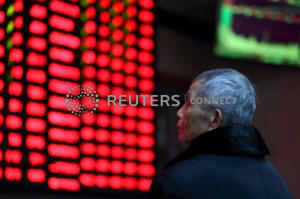|
Global shares nudge higher, Aussie dollar
rebounds after slide
 Send a link to a friend
Send a link to a friend
 [February 22, 2019]
By Ritvik Carvalho [February 22, 2019]
By Ritvik Carvalho
LONDON (Reuters) - Global shares rose on
Friday as signs of progress on trade offset a worsening economic
outlook, while the Aussie dollar recouped some losses after China denied
it had halted Australian coal imports.
Earnings from companies drove big stock swings as European markets
opened. The pan-European STOXX 600 index was up 0.1 and Germany's DAX
0.2 percent.
Shares in Asia were buoyed by a late rally in Chinese shares, with the
main blue-chip index of Chinese shares rising 2.2 percent.
Chinese shares had faltered earlier amid concern about slowing domestic
growth and indications that China would cut its benchmark interest rate
only as a last resort to boost the economy.
Japan's Nikkei ended 0.2 percent lower after data showed core consumer
inflation accelerated in January but remained far from the central
bank's 2 percent target.
Australian shares gained 0.5 percent and Seoul's Kospi ended up 0.1
percent.

The MSCI All-Country World Index, which tracks shares in 47 countries,
was less than 0.1 percent higher on the day.
Trade talks and a growing number of policy U-turns by global central
banks have propped up equities in recent weeks.
Trade talks between U.S. and Chinese negotiators continued in
Washington, with little more than a week left before a U.S.-imposed
deadline expires, triggering higher tariffs.
Reuters reported on Wednesday the two sides were drafting language for
six memoranda of understanding on proposed Chinese reforms, progress
that had helped to lift investor sentiment.
Chinese Vice Premier Liu He will meet with U.S. President Donald Trump
at the White House on Friday, the White House said.
"Given that enough headway seems to have been made to warrant a meeting
between Trump and the Chinese negotiator today, it appears more likely
that the U.S. will not raise the levies, which should help high-beta
currencies and equities push higher," said Konstantinos Anthis, head of
research at ADSS.
However, U.S. data showed its economic outlook was growing cloudy. The.
Commerce Department said on Thursday domestic orders for non-defense
capital goods excluding aircraft unexpectedly fell 0.7 percent in
December.
[to top of second column]
|

A man looks on in front of an electronic board showing stock
information at a brokerage house in Nanjing, Jiangsu province, China
February 13, 2019. REUTERS/Stringer

AUSSIE REBOUND
The Australian dollar recovered after falling more than 1 percent on
Thursday, when Reuters reported the Chinese port of Dalian had
banned imports of Australian coal indefinitely.
China's foreign ministry said on Friday coal imports continued but
customs had stepped up inspections environment and safety checks on
foreign cargoes.
Reserve Bank of Australia Governor Philip Lowe cautioned against
seeing restrictions as being directed at Australia, and Prime
Minister Scott Morrison said the ban does not indicate a souring
relationship between the countries.
Separate comments by Lowe that a rate increase may be appropriate
next year also helped to boost the Aussie dollar. It was last up
0.35 percent at $0.71120.
Elsewhere, the euro was 0.1 percent higher at $1.1346, nearing a
two-week high. German business morale fell for a sixth time in a
row, to its lowest in over four years, a survey showed.
European Central Bank policymakers asked for swift preparations to
give banks more long-term loans, minutes of its last meeting showed
on Thursday.
The dollar index, which tracks the currency against six others, was
down 0.1 percent at 96.549.

Italian government bond yields crept up on Friday, reflecting
caution among investors before a Fitch ratings review.
U.S. crude oil rose 0.3 percent to $57.14 a barrel. Brent crude was
up nearly 0.2 percent at $67.18.
Spot gold was trading up about 0.2 percent at $1,325.83 per ounce.
(Reporting by Ritvik Carvalho; editing by Larry King)
[© 2019 Thomson Reuters. All rights
reserved.]
Copyright 2019 Reuters. All rights reserved. This material may not be published,
broadcast, rewritten or redistributed.
Thompson Reuters is solely responsible for this content. |